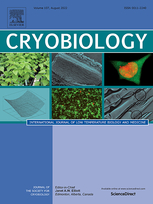
Altération osmotique des cellules PC-3 causé par les solutions de NaCl hypertoniques à des températures supérieures à 0 °C.
Osmotic injury of PC-3 cells by hypertonic NaCl solutions at temperatures above 0 °C.
Auteurs : ZAWLODZKA S., TAKAMATSU H.
Type d'article : Article
Résumé
Cell injury due to osmotic dehydration, which is regarded as a major cause of injury during freeze-thaw processes, was examined closely using a perfusion microscope. Human prostatic adenocarcinoma cells (PC-3), which were placed in a chamber, were subjected to hyperosmotic stresses by perfusing NaCl solutions of varying concentrations into the chamber. Cells were exposed to 2.5 and 4.5 M NaCl solutions for 1-60 min. by changing the concentrations at 0.2, 1, and 10 M/min. Decrease in cell viability was biphasic: the viability decreased first after the increase in NaCl concentration due to dehydration and then after return to isotonic conditions due to rehydration. Rehydration was substantially more responsible for cell injury than dehydration, which was marked at lower NaCl concentrations and lower temperatures. Injury resulting from contraction was negligible at the 2.5 M NaCl solution. While the hypertonic cell survival, which was determined without a return to isotonic conditions, was almost independent of time of exposure to hyperosmotic concentrations, the post-hypertonic survival after returning to isotonic conditions decreased with increasing exposure time, suggesting that the rehydration-induced injury was a consequence of time-dependent alteration of the plasma membrane. The post-hypertonic survival was lower for higher NaCl concentrations and higher temperatures, which was qualitatively consistent with previous studies. Effects of the rate of concentration change on the post-hypertonic cell survival were observed at 4.5 M; the highest rate of survival was obtained by slower increase and faster decrease in the NaCl concentration. However, the effect was negligible at 2.5 M.
Détails
- Titre original : Osmotic injury of PC-3 cells by hypertonic NaCl solutions at temperatures above 0 °C.
- Identifiant de la fiche : 2005-2841
- Langues : Anglais
- Source : Cryobiology - vol. 50 - n. 1
- Date d'édition : 02/2005
Liens
Voir d'autres articles du même numéro (3)
Voir la source
Indexation
-
Contribution of extracellular ice formation and...
- Auteurs : TAKAMATSU H., ZAWLODZKA S.
- Date : 08/2006
- Langues : Anglais
- Source : Cryobiology - vol. 53 - n. 1
Voir la fiche
-
A parametric study of freezing injury in BPH1(C...
- Auteurs : GEESLIN M. G., SWANLUND D. J., BISCHOF J. C.
- Date : 05/2007
- Langues : Anglais
- Source : CryoLetters - vol. 28 - n. 3
Voir la fiche
-
Ultrastructural changes associated with cryopre...
- Auteurs : KACZMARCZYK A., RUTTEN T., MELZER M., et al.
- Date : 03/2008
- Langues : Anglais
- Source : CryoLetters - vol. 29 - n. 2
Voir la fiche
-
Risk management in cryopreservation associated ...
- Auteurs : TOMLINSON M.
- Date : 03/2008
- Langues : Anglais
- Source : CryoLetters - vol. 29 - n. 2
Voir la fiche
-
Sperm membrane fatty acid composition in the Ea...
- Auteurs : MILLER R. R. Jr, SHEFFER C. J., CORNETT C. L., et al.
- Date : 10/2004
- Langues : Anglais
- Source : Cryobiology - vol. 49 - n. 2
Voir la fiche
